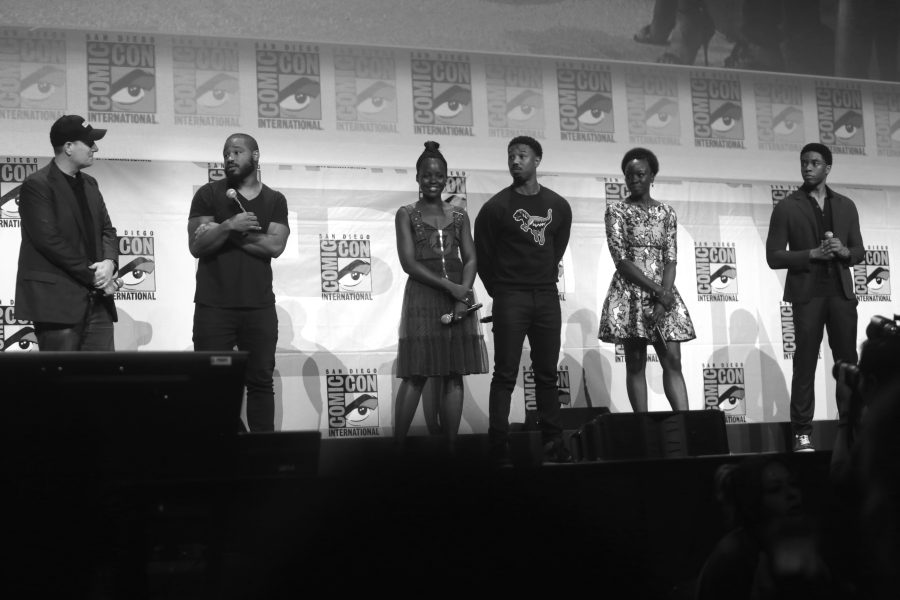Marvel’s newest movie, “Black Panther,” is coming out on Feb. 16 and many people are excited to see it considering it scored 99 percent on Rotten Tomatoes. But, who exactly is the Black Panther? Unlike Marvel’s flagship characters like Captain America and Spider Man, those that are not interested in comic books are probably not familiar with the character. Getting some background information is sure to enhance the already incredible movie.
Black Panther is actually a title; the people of Wakanda, a fictional African nation that has the greatest technology on the planet, refer to their king as the Black Panther, similar to how the kings of Egypt were all referred to as “pharaoh.” The current Blank Panther is T’Challa, a genius on par with Tony Stark, a warrior of greater skill than Wolverine, and a patriot as dedicated as Captain America. In order to truly understand Black Panther, you must first understand Wakanda.
Wakanda was able to develop its economy and technology to unprecedented levels from its exclusive access to the vibranium, a metal of extraterrestrial origins which can absorb all vibrations. Wakanda is so advanced that the iconic Quinjet and the Falcon’s flight suit were both gifts from Black Panther to the Avengers upon joining.
Black Panther’s suit, called the Panther’s Habit, is the traditional armor worn by each successive Black Panther. It is able to completely negate the kinetic energy of bullets due to it being weaved with vibranium. It also enables seeing into the infrared spectrum, which is mostly used to enhance night vision.
Wakanda is equally unique in that it has held onto its cultural heritage over the course of millennia, which is based on the panther goddess Bastet, who is actually a historical goddess from Egypt.
An heir of the king can only take the royal crown and the mantel of Black Panther if they satisfy Bastet. The heir performs several ancient rituals in order to commune with Bastet, who takes the shape of a black panther or a humanoid equivalent, in order to be interrogated by her. Once Bastet approves, the new king is allowed to be anointed by a potion made of the “Heart-Shaped Herb, a process that will either result in enhanced strength, agility, senses, and durability or death.”
Black Panther is extremely unique across all of modern heroes in that he is equally part scientific, part mystical, and part nationalistic.
Black Panther wears a suit made of the most cutting-edge technology and materials on Earth, has a cherished relationship with the deity and ancestors of Wakanda, and is the Chief of State of the most powerful nation on the planet. In addition, the Black Panther comics have advanced race relations more than any other.
Many people shower praises on Stan Lee and Jack Kirby for creating a black protagonist in 1966, but they are missing the point. Luke Cage, who was created in 1972, and the X-Men’s Storm, who was created in 1975, are both black superheroes who were mainstream during the Civil Rights movement. Luke Cage was a Harlem gangster wrongly convicted for possessing illegal drugs and acquired his powers from an experimental procedure he volunteered for to shorten his sentence. Storm’s past is not much more glamorous: she was forced to spend her childhood as a petty thief in Egypt because her parents died in the crossfire of war. In great contrast is Black Panther, who was raised since birth as the heir of an affluent nation, received expert tutoring until he excelled in all subjects, and was trained in strategy and combat by the greatest warrior in the country—his father.
In addition, Wakanda is the richest nation in Africa many times over, housing an economic system that has destroyed any income gap, natural resources that are the envy of the world, and a stable political system that has survived many attempted coups and invasions.
In every way, Black Panther and Wakanda are the anti-stereotype of an African person and nation. The key word in that sentence is “African.” In the Fantastic Four #52, one of the greatest superhero teams in the world loses a sparring match to an African, who then shows them his hyper-technological society, located in the heart of Africa. In every appearance after then, both he and his country are portrayed as majestic, magnificent, and magnanimous. The difference between an African-American superhero and an African superhero is tremendous. The former is a symbol of how a black person can achieve greatness in a predominately white society, while the latter shows how predominately black society can be glorious without any assistance from Western nations.
This idea—that Africa is not a desolate wasteland to be ashamed of and can be just as prosperous and worthy of celebration as anywhere else—is what “Black Panther” exemplifies more than anything else.





















































